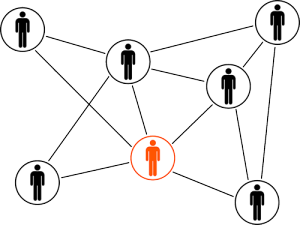 In the context of the development of organizations, there is one concept which emerged as one of the most influential concepts in social sciences over the last years (Hughes, Jewson, & Unwin, 2007): The concept of “Communities of Practice’” (CoP). The name was first mentioned by Wenger, 1998. CoPs can be defined as “groups of people informally bound together by shared expertise and passion for a joint enterprise” (Wenger, 2000, p.139). For example, if you are a manager who is specialized in Content Strategy, the outcome of your CoP would mostly be knowledge. Insofar, CoP can be seen as important approaches to informal learning. There are many different forms of CoPs: Some are within an organization, others extend across organizational boundaries. Some have fixed meetings, others are more loosely organized. Communities of Practice can take place in face-to-face meetings, in the coffee lounge, via e-mail distribution or social networks. The difference between a CoP and a project team or an informal working group is that the goal of a CoP is to further develop the skills and knowledge of its members (Wenger & Snyder, 2000). Furthermore, the members of a CoP identify themselves with the group expertise and show commitment and passion for the subject matter (Wenger & Snyder, 2000).
In the context of the development of organizations, there is one concept which emerged as one of the most influential concepts in social sciences over the last years (Hughes, Jewson, & Unwin, 2007): The concept of “Communities of Practice’” (CoP). The name was first mentioned by Wenger, 1998. CoPs can be defined as “groups of people informally bound together by shared expertise and passion for a joint enterprise” (Wenger, 2000, p.139). For example, if you are a manager who is specialized in Content Strategy, the outcome of your CoP would mostly be knowledge. Insofar, CoP can be seen as important approaches to informal learning. There are many different forms of CoPs: Some are within an organization, others extend across organizational boundaries. Some have fixed meetings, others are more loosely organized. Communities of Practice can take place in face-to-face meetings, in the coffee lounge, via e-mail distribution or social networks. The difference between a CoP and a project team or an informal working group is that the goal of a CoP is to further develop the skills and knowledge of its members (Wenger & Snyder, 2000). Furthermore, the members of a CoP identify themselves with the group expertise and show commitment and passion for the subject matter (Wenger & Snyder, 2000).
Communities of Practice are a great opportunity for start-ups; to, first, network within their field; and, second, to learn from others. Communities of Practice cannot only be interesting and inspiring within a certain profession or industry, but in particular for the start-up phase when establishing your own company.
In Germany, there is an online portal called Gründerszene (http://www.gruenderszene.de/), where start-ups can get useful information or catch up with others on certain special topics.
Coaching with Inspired Executives supports start-ups in the creation and implementation of their vision, mission and value proposition. Not only does coaching help keep your stress levels in check, it also fosters the dialogue within the start-up team and with prospect clients. Or if you plan to set up a Community of Practice, contact Annette for further information.
Hughes, J., Jewson, N., & Unwin, L. (2007). Introduction. Communities of practice: a contested concept in flux. In J. Hughes, N. Jewson, & L. Unwin (Eds.), Communities of practice. Critical perspectives (pp. 1–16). London, New York, NY: Routledge.
Valaitis, R. K., Akhtar-Danesh, N., Brooks, F., Binks, S., & Semogas, D. (2011). Online communities of practice as a communication resource for community health nurses working with homeless persons. Journal of Advanced Nursing, 67(6), 1273–1284. doi:10.1111/j.1365-2648.2010.05582.x
Wenger, E. (1998). Communities of practice: Learning, meaning, and identity. Cambridge, U.K, New York, N.Y: Cambridge University Press.
Wenger, E. (2000). Communities of Practice and Social Learning Systems. Organization, 7(2), 225–246. doi:10.1177/135050840072002
Wenger, E. C., & Snyder, W. M. (2000). Communities of practice: The organizational frontier. Harvard business review, 78(1), 139–146.
